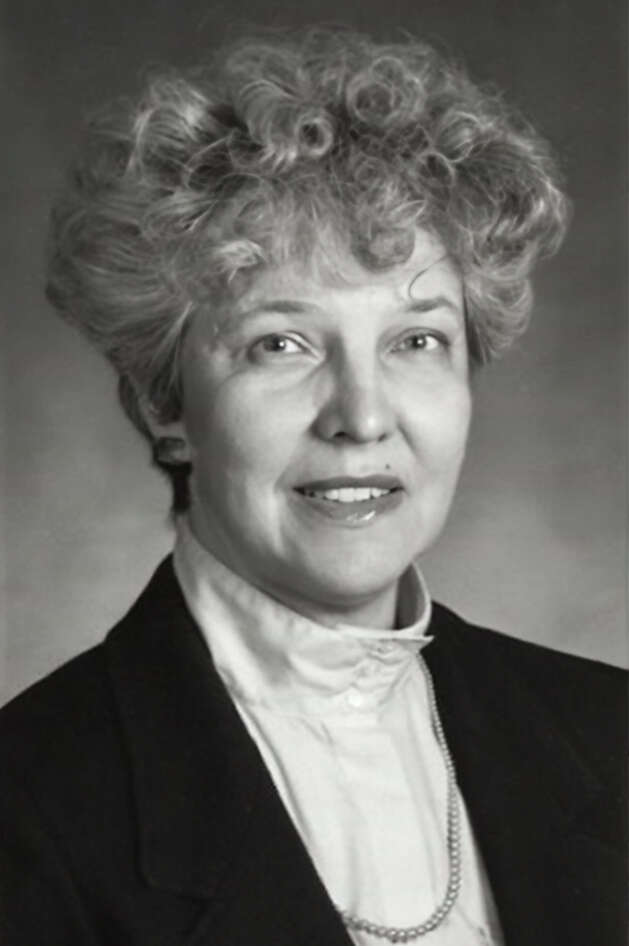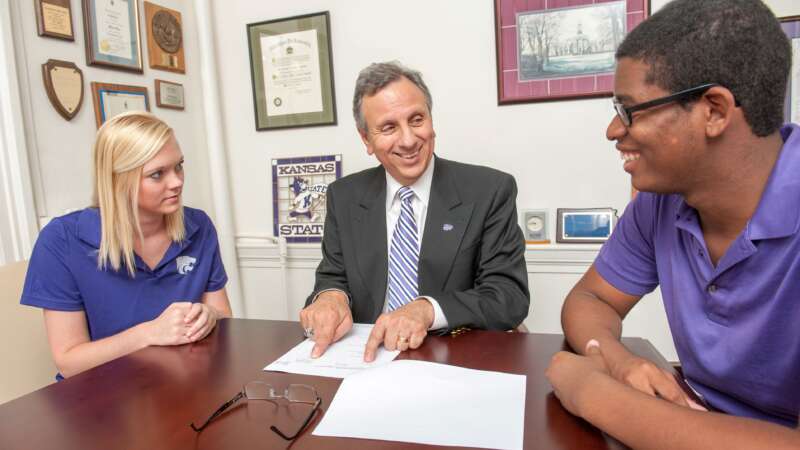Nancy Twiss was the gentle, determined power behind K-State’s student scholar “boot camp.”
One coach is famous for building K-State’s on-field reputation. The other is less of a household name — but she built our academic reputation.
“Nancy Twiss was the Bill Snyder of national scholarship competitions. She represented everything great about our university,” said Pat Bosco, former vice president for student life and dean of students at K-State.
Beginning in the late 1980s, Bosco and then-university president Jon Wefald built a recruiting strategy around Twiss’ ability to take bright, motivated students and guide them to winning Rhodes, Marshall, Truman, Goldwater and other nationally competitive scholarships.
During her 16-year tenure, which ended in 1996, 60 K-State students won these prestigious scholarships.
“She was our secret weapon, our purple bullet,” Bosco said. “She propelled K-State to be the number one public university when it came to winning prestigious scholarships, right up there with the Ivy Leagues.”
Mentor in the making
Nancy Hubbard (Twiss) was born in 1933 in Wichita, Kansas, and was raised by a single mother who taught high school English. Her father died shortly before she was born.
Her husband, Page Twiss, taught geology at K-State. They had three children — Steve, Catherine and Tom — and were active in the Manhattan community, especially through their advocacy for civil rights.
“Mom didn’t work while her kids were young, but once we were all in school, she found a job in the College of Arts and Sciences dean’s office,” said her son Steve Twiss. “It started out as a part-time position, but she worked full-time anyway. As the years went by, she took on added duties of pre-law advisor and later the competitive scholarship advisor.”
Nancy passed away in May 2025 at the age of 91. She was preceded in death by her husband and daughter.
A winning radar
Twiss had an uncanny ability to discover students with promise across the university, not just in the honors program or among the obvious top students.
“She had tentacles all over campus,” said Kent Bradley, a 1986 Truman scholar and now-OB/GYN doctor. “She found and mentored students that maybe other people didn’t see had potential.”
With two Rhodes scholar recipients — Mary Hale (Tolar) and Janelle Larson — 1989 was a stellar year for K-State. National media zoomed in on the Kansas college that, like the Ivies, won more than one of the 32 awards. They asked, “What’s happening at K-State?”
“I wouldn’t have applied for the Rhodes if it weren’t for Nancy,” Larson said. “I was doing it to keep her happy. I didn’t really think I had a chance of getting it.”
Larson believed her animal science major and production agriculture background were a weakness for a scholarship that promotes international understanding and peace. But Twiss saw Larson’s ranching background as a stand-out strength — and was proven right.
“Nancy fundamentally believed that talent was everywhere, and we just needed to devote time and energy to developing it,” said Tolar, who is now dean of K-State’s Staley School of Leadership. “She believed that if you put the resources out there, the bright, invested students pick them up, and you help them succeed.”
And help she did!
Human search engine
Twiss’ work preparing students for scholarship applications and interviews was legendary. Students underwent what Shante Moore affectionately called “the Nancy Twiss boot camp.”
Moore, a 1996 Truman Scholar and current diplomat in the U.S. State Department, expressed a common memory shared by students who worked with Twiss.
“She would connect us with professors to talk through our research and challenge us,” Moore said. “We’d have interview practice sessions with different professors, and they were tough, but they helped me compete.”
Twiss’ office was a haven of resources, reading lists and packets of articles tailored to each student’s research interests. Long before Google existed, Twiss curated information and connections that helped students broaden their outlook.
“With Nancy, it was more of a Socratic approach to education. She would challenge what you’d written and said and make you defend it and expand on it,” Bradley explained. “I’m not sure when she slept because we would work late into the night and then the next day, she would say, ‘I read some articles that might be relevant to the topic we were discussing yesterday.’ We had to do all the work ourselves, but there was a method to her madness. We felt prepared and comfortable with our answers because we had already worked through them with her.”
Tolar, who majored in history as an undergraduate, credits Twiss with a good chunk of her learning.
“Half of my readings came from her,” Tolar said. “The most intensive class I took was not a class; it was the four years I engaged with Nancy.”
Moore said, “She was always thinking three or four steps ahead about your future. It was intimidating at first, but you knew she wanted the best for you.”
Spawning a new profession
As K-State’s success grew, public universities across the country clamored for Twiss’ help in replicating K-State’s program.
“She wouldn’t give away all her secrets, but she was such a kind person who was committed to student growth,” Bosco said. “She would always share what we were doing. Schools would try to replicate it, but our secret weapon was Nancy, and they didn’t have her.”
Beth Powers currently holds the position Twiss created at K-State. Powers, along with former advisor Jim Hohenbary, carries on Twiss’ legacy.
“She shaped a whole profession,” Powers said. “Nancy was considered the founding spirit of the National Association of Fellowship Advisors. At the first NAFA conference, there was a tribute to her.”
Before Twiss consulted with other universities, the schools winning the most prestigious scholarships were the Ivy Leagues and K-State. But Twiss helped other public state universities become competitive.
“You can do this just about anywhere if you devote the time and energy and resources to it. And that made state schools in particular say, ‘We need to do this’,” Powers said. “That’s where the profession really started growing, through state schools.”
Living legacy
Twiss kept mentoring her students long after they crossed the commencement stage. Her brain never stopped working to connect people to advance their work or knowledge.
“Here I was, in my late 40s, and Nancy was still mentoring me; still active and engaged,” said Larson, who is a professor of agricultural economics at Penn State. “She’d say, ‘Do you know this person? They were a few years behind you at K-State, but they’re doing great work. You should get to know them.’ She believed in the work her students do. She was a passionate advocate for social justice and making the world a better place, and she motivated students not for reward or recognition, but to use the opportunities given to us make a difference.”
Larson was leading a study abroad team when she learned of Twiss’ passing. The group was at the Children and Youth Empowerment Centre in Kenya, which was founded by Paul Maina, a fellow Rhodes scholar Larson met while at Oxford.
“I told my students that if it weren’t for Nancy, we wouldn’t be here in Kenya,” Larson said. “I told them, ‘You are all her legacy because she helped form me, and part of what I’m doing in Kenya is motivated by values she shared.’ So we all raised a cup of tea for Nancy Twiss.”
How to remember Nancy
Support her scholarship
The Nancy Twiss Memorial Fund supports a scholarship for a nationally competitive scholarship student who did not win — but put in the work.
Share a memory of Nancy
Share your memory by filling out this form.
Remembrances
“Nancy brought together faculty from across the campus to participate in the selection and mock interview processes. I came to know some colleagues primarily through our interaction in these processes. Such was the case, for instance, with our late friend Eugene Kremer, who was Head of the Architecture Department and a fascinating participant in the Truman interviews. I have always found K-State to be an exceptional university in its high level of interdisciplinary communication and collegiality. Nancy both drew upon that strength and helped to enhance it.”
Dr. William Richter, professor emeritus of political science, Kansas State University
“Nancy was all that was written above but so much more. She was always concerned about important issues, but I never heard her trash anyone. She was an important part of the Manhattan Alliance for Peace and Justice and of the Head Start Program in Manhattan.“
Anne Cowan, Manhattan, KS
When I met Nancy I was in the second semester of my junior year, miserable in my Pre-Med major and questioning whether law school would better match my talents and burgeoning passion for social justice issues. She showed me a path forward. Without Nancy, I never would have applied to Columbia Law School, much less gotten in. Now almost 40 years later, as I read about her passing from my home in NYC, I can say with all honestly that I have the life I have today because of Nancy Twiss. I only regret that I didn’t write her and thank her one of the thousand times I’ve thought of her over the years. I’m so deeply grateful to Nancy and send my deepest condolences to her children and all who loved her.
Melinda Dutton, New York, NY
Nancy was my advisor from ’80 to ’83. Her encouragement and positive attitude kept me in college. I only graduated thanks to her support and understanding. I will remember her with gratitude!
Jimmy James, Chanute, KS



